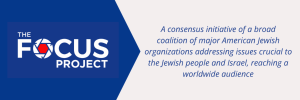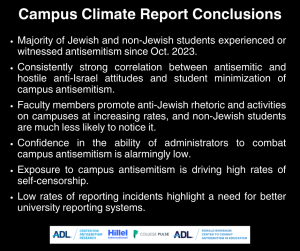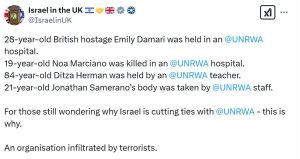
![]()
BACKGROUND – TALKING POINTS – ACTIONS – HOSTAGE UPDATE – STORIES
![]()

Combatting antisemitism – anti-Jewish hatred – on university campuses has been an arduous process this past year, requiring an all-hands on deck approach. In the face of pressure from alumni, student groups and government agencies, some campuses have enacted new or updated policies. Despite the efforts, bias, harassment, vandalism and extremist rhetoric continue to undermine the safety of Jewish students and faculty on too many campuses.
Havard Reaches Landmark Legal Settlement with Brandeis Center
The prestigious Ivy League school recently agreed to a major settlement. The Louis D. Brandeis Center for Human Rights Under Law and Jewish Americans for Fairness in Education filed a federal lawsuit on behalf of Harvard students in May claiming years of “cruel antisemitic bullying, harassment and discrimination.”
As part of the settlement, Harvard’s existing Non-Discrimination and Anti-Bullying Policies will be updated to incorporate the International Holocaust Remembrance Alliance definition of antisemitism and use IHRA when evaluating complaints of anti-Jewish discrimination and harassment. Additional steps include recognizing “conduct that would violate the Non-Discrimination Policy if targeting Jewish or Israeli people can also violate the policy if directed toward Zionists.”
“When fully and faithfully implemented, this agreement will help ensure that Jewish students are able to learn and thrive in an environment free from anti-Jewish hate, discrimination and harassment,” said Kenneth L. Marcus, founder and chairman of the Brandeis Center.
New Administration Takes Bold Action
President Trump recently signed an executive order, Additional Measures to Combat Anti-Semitism, that reinforces his first-term EO regarding Title VI civil rights complaints. The order directs federal agencies to identify and utilize all available civil and criminal legal tools to combat antisemitism on campuses, including prosecuting and holding accountable perpetrators of unlawful harassment and violence. It also mandates comprehensive reporting from key agencies on civil rights violations, encourages the use of civil rights enforcement authorities and calls for monitoring and the potential removal of foreign individuals involved in anti-Jewish activities. Details regarding the order’s implementation have not been disclosed, but it received some bipartisan Congressional praise.
Some groups hailed it as a means to deport foreign students who support Hamas and who violate the civil rights of Jewish students. Director of Education and Community Engagement at North American Values Institute Brandy Shufutinsky: “Individuals who are in our country by invitation should have that invitation rescinded when they engage in behaviors that violate the civil rights of our citizens.”
Other groups are alarmed that the order targets specific groups of students, potentially taking legal action without due process. Free speech rights also are at risk of being violated. National Council of Jewish Women: “Policies designed to protect Jewish communities should address antisemitism in all of its manifestations and from all corners of society. Antisemitism should never be weaponized.”
The new executive order contains other directives, including the “formation of a multi-agency Task Force to Combat Antisemitism. The first priority of the Task Force will be to root out antisemitic harassment in schools and on college campuses.” This initiative builds on President Biden’s National Strategy to Counter Antisemitism.
Additional measures include launching an investigation of campus antisemitism by the independent U.S. Commission on Civil Rights. More than 60 lawmakers recently reintroduced the bipartisan Holocaust education bill. The Dept. of Justice also announced a multi-agency task force to combat antisemitism, and the Dept. of Education announced an investigation into five universities: Columbia, Cal Berkeley, Portland State, Northwestern and Univ. of Minnesota, Twin Cities. This initiative will help tackle a growing backlog of civil rights complaints.
Campus Climate Update
The recently released Campus Climate Report: Campus Antisemitism One Year After the Hamas Terrorist Attacks, was conducted by the ADL, Hillel International and College Plus. It included stories from Jewish students about the harassment they face on campus:

The ADL’s recommendations from a year ago have finally been enacted on some campuses to enforce student conduct codes, investigate anti-Israel groups for glorifying terrorists and establish task forces for addressing antisemitism. Despite these efforts, StandWithUs reported that many students still feel forced to hide their Jewish identity and need to be cautious when participating in certain campus activities.
More Work Needed
Recent events spotlight major issues remaining on certain campuses. On International Holocaust Remembrance Day, 60 Ohio State Univ. students protested outside a Jewish student center where Israeli veterans wounded in the Hamas 10/7 attacks spoke about their experiences. OSU Students for Justice in Palestine protesters chanted for an “intifada” – violent attacks against Israelis – and condemned the injured soldiers as ‘war criminals.’ Student Adam Kling: Threatening Jews 6,000 miles from Israel does nothing for Palestinians.
Calls to “globalize the intifada” by SJP chapters and other anti-Israel groups are common. The Univ. of Michigan announced that it suspended its SJP chapter for up to two years after masked activists protested outside the homes of university officials. Florida banned two SJP chapters last year. Columbia Univ. remains a hotbed of antisemitism. Anti-Israel vandals recently poured cement down toilets and vandalized buildings with red paint.
University faculty also are a source of division on campus. NY’s governor condemned the City University of New York system’s faculty union boycott vote against Israel. The university also condemned the vote. In response, Students, Alumni and Faculty for Equality on Campus filed a complaint with the New York State Division of Human Rights against the boycott. NYC Councilmember Inna Vernikov: “They’re clearly telling us that none of them are unbiased enough to mold the minds of the next generation.”
![]()

![]()

A. Ask your Congress members to support legislation against anti-Jewish hatred: Contact your U.S. Representative and Senators to advocate for bipartisan legislation that addresses antisemitism on campuses, strengthens civil rights protections for Jewish students and ensures schools are held accountable for failing to combat hate. Recently, more than 60 lawmakers reintroduced the bipartisan Holocaust education bill – the Holocaust Education and Antisemitism Lessons Act. The ADL has an action form that can be used to contact your Congressional members.
B. Jews and non-Jews must stand united against hate: The fight against discrimination is a shared responsibility that transcends backgrounds and ideologies. We should all be able to agree there is no justification for attacks on Jews and other minority groups in America on the basis of their heritage or religion. Connecting with organizations and initiatives that are dedicated to countering hatred and violence will lead to more equality for everyone.
![]()
Seven Israeli and Five Thai Hostages Returned to Israel
Two of the hostages released on Jan. 30 left Gaza the same way they entered: surrounded by Palestinian civilians cheering and jeering. Some Palestinian men used their cell phones to take selfies with 80-year-old Gadi Moses as he was paraded by masked gunmen representing four Palestinian terror groups. Hamas did not stage the release for the five Thai men.
Arbel Yehoud, Gadi Mozes and Agam Berger were exchanged for 110 Palestinian prisoners. Five agricultural workers from Thailand also received their freedom. Two days later, hostages Yarden Bibas, Keith Siegel and Ofer Calderon freed after 484 days in Hamas captivity. Sadly, Yarden Bibas returned home without his wife and two young children. His family and Jews around the world fear the worst: they will be returned in coffins. Israel released another 183 prisoners. Under the Palestinian Authority’s ‘Pay to Slay’ program, 734 Palestinian terrorists released during the first phase of the ceasefire deal received monthly PA salary rewards since their arrests totaling at least $141 million.
Hamas Terrorists Intentionally Targeted Thai Nationals
Gazans and pro-Hamas activists recently stated that the kidnapping of laborers from Thailand was an ‘accident.’ However, Hamas terrorists spoke to the workers in their native Thai language to lure them out. The Iran-backed terrorists killed 44 Thais on 10/7 and took 31 hostages – 23 were released in Nov. 2023. In Thailand, the recently hostages – Thenna Pongsak, Sathian Suwannakham, Sriaoun Watchara, Seathao Bannawat and Lamnao Surasak – were reunited with their families. Other Thai farmhands who survived Oct. 7 recently returned to the fields as they work through their trauma.
United Nations Complicity Continues
The UN Relief and Works Agency is dedicated solely to helping Palestinians but critics consider it a major obstacle to peace and coexistence because it employs terrorists and fosters anti-Israel education. Released hostage Emily Damari told the British prime minister that she was held at UNRWA facilities and denied medical care. A month after the UN agency boasted it “runs all UN shelters in Gaza”, UNRWA alleged that it did not have access to its own shelters and is calling for an investigation. The Israeli military recently found weapons inside a West Bank UNRWA humanitarian facility. Israel recently cut its ties with the UN agency and the U.S. is expected to follow suit.
Hamas admitted that terror chief Muhammed Deif and other Hamas leaders operated an HQ inside displacement zones that sheltered civilians. Deif was killed in an Israeli strike in one of these zones. Also, Iran hosted Hamas leaders, praised its “historic victory” in Gaza and vowed to continue supporting Hamas in coordination with Qatar, which is continuing to support terrorists.

Gadi Moses to Hamas Captors: ‘When there is peace, I will return to teach you agriculture’
Israelis hope for a peaceful future rooted in cooperation while Hamas remains committed to killing Jews. Gadi wants to return to Gaza to teach Palestinians – including Hamas terrorists – how to grow food. A 69-year-old released Palestinian prisoner blasted Hamas and the price of the 10/7 attacks: “I tell my grandchildren not to go down the path of attacks and resistance. We don’t want our freedom to come at the expense of our children’s lives.” Israel’s interior minister stated: “We should allow Palestinians to have a livelihood and hope – we should allow Palestinian workers to work in Israel while maintaining security.”

More Hostage-Related Headlines
![]()

Stories Impacting the U.S. and Israel
Stories From Around the World
![]()
In light of the surge of current relevant news, please subscribe to our Daily News Brief, a digest of critical news headlines curated from thousands of media addressing issues that affect the Jewish world.
![]()

This content is developed by The Focus Project in partnership with MERCAZ USA. The Focus Project distributes weekly news and talking points on timely issues concerning Israel and the Jewish people, including antisemitism, anti-Zionism and the delegitimization of Israel. It represents a consensus view across a spectrum of major American Jewish organizations. MERCAZ USA recognizes and respects the diversity of views on these issues among its readers and the community at large.
![]()